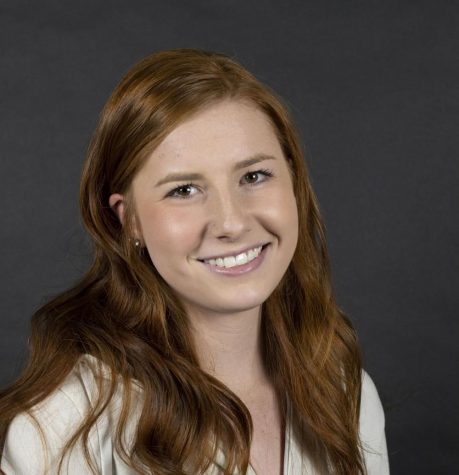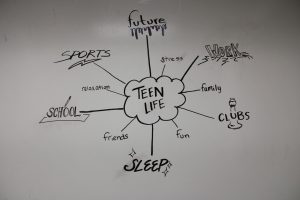ADHD Misconceptions In Raptor Community
March 25, 2019
One of the commonly misused terms amongst people, focused primarily on teenagers, is the incorrect use of ADHD. Many of the people misusing ADHD don’t actually know what it means. Attention-Deficit/ Hyperactivity Disorder, ADHD, is a brain disorder marked by a continuous pattern of inattentiveness and/or reoccuring struggles with hyperactivity that can disrupt development and functioning skills.
This brain disorder is not, however, a vocabulary term meant to excuse irresponsible actions or laziness.
There has been an inexcusable pattern of the incorrect use of ADHD in people’s everyday vocabulary, and it is not only disrespectful, but also something that needs to be stopped. Whether or not someone has Attention-Deficit/ Hyperactivity Disorder, it is still not an excuse for a person’s mistakes. People with ADHD may struggle more with some of the basic functioning skills than others without the disorder. From the inability to sit still for a certain period of time, to not being able to stay attentive in certain situations, there are various ways that ADHD can affect those who have it.
Sean Highland, a counselor at Eaglecrest, has an immense background in special education. Highland shared some input into his perspective on what ADHD actually is, “Before I was a counselor I was a special education teacher, and my wife is actually a special education coordinator. We actually talk about it a lot. With ADHD, there is really a wide umbrella, so when you’re looking at Attention-Deficit/ Hyperactivity Disorder many don’t really know how to exact whether it’s ADHD or ADD.” There are a variety of differences that go into each case of ADHD, and there is no precise effect on each person.
One member of the Eaglecrest community has experienced these effects personally in her own life. Hannah Jenky shares some of her own encounters with ADHD playing a role in her life, “ I was diagnosed with ADHD when I was in about fourth grade, and it was because I couldn’t sleep. So then I went to a doctor about it, you know, and then I started therapy. The doctors were just like, ‘Oh, you have ADHD and it’s really affecting your sleep.’ So I had really bad insomnia for a while and I had to take ADHD medicine for it and sleep medicines.” ADHD has many effects on people that others, who don’t truly know, wouldn’t quite comprehend.
Jenky shares another way that Attention-Deficit/ Hyperactivity Disorder has affected her life, “It also really sucks when all your friends are in all these advanced classes, and they’re doing so well at it, and you can’t. When you can barely do normal classes because you can’t sit still for a whole class period and you also can’t…you just zone out. You don’t do it on purpose, it just happens and you end up beating yourself up for it.”
From hyperactivity to inattentiveness, there are many ways ADHD can affect the person who has it. Jenky’s experiences are certainly not the only examples of the role ADHD plays in affecting the way people live. It is important to know exactly what ADHD is and the common occurrences of it affecting people’s lives.
Carrie Weatherby, Student Achievement Services Department Chair, explains some of the major misconceptions concerning Attention-Deficit/ Hyperactivity Disorder in everyday lives, “When it’s diagnosed, it should be diagnosed by someone who is actually an expert in that area. I’m always curious when someone says they were diagnosed but there’s been no doctor follow-up in years, because you don’t know how it changes. There’s ADHD Inattentive, there’s ADHD Hyperactive, and then there’s ADHD Combined/Mixed type, which has a little bit of both. Within each of those, what a person struggles with is going to be completely different. I think it’s really important that if someone says they have ADHD, that they understand what that means and what their weaknesses are.” It’s necessary for every person with ADHD to continue to follow-up with their doctor.
With such a variety of effects from ADHD, people need to know how to cope with their specific struggles. Weatherby gives more examples of ADHD in everyday situations, “Someone who has executive functioning deficits, or ADHD, their frontal lobe is going to develop a lot slower and later. So in the schools, for example, telling you to study for a test and they say, ‘Well we gave some study tips in Raptor 101’ that may work for kids whose frontal lobe is just fine. They might just need a couple study tips and they’re going to figure that out on their own. Someone who has ADHD, who maybe has a weakness in organizing, time management, prioritizing, breaking big things down into smaller chunks- all of these are examples of executive functioning- if they have difficulty in one or multiple areas, they’re going to need someone to really help them while they practice instead of just teaching them.”
Weatherby continues to the describe the consequences of someone claiming to have ADHD, when they actually don’t, “Throughout my career I have often heard people self diagnose they’re like, ‘Well I have ADHD.’ And I say ‘Well do you have a doctor’s note?’ Well no, but I have family members who have, so I know I have it.’ I just don’t think that anyone should ever self diagnose. They should always get checked out. It’s really important that doctor’s there to help support, and to help strategize. I don’t like people using it as an excuse, so the way I’ve always said it is that it’s not an excuse; it’s an explanation.” ADHD does not excuse laziness or forgetfulness, but it does explain why certain situations affect different people more than others. It’s not a one-time forgotten assignment. It’s a continuous pattern of leaving a completed assignment in your folder or at home.
Another student at Eaglecrest shares similar experiences with Attention-Deficit/ Hyperactivity Disorder, however; they have also witnessed the misuse of ADHD to excuse misbehavior or laziness. Hyrum Anderson shares that, “There’s kind of a popular stigma towards it where people use it as a term for energetic, when it’s so far from that. Especially when having depression and ADHD, I can be very distractible and not energetic at all. I think there’s a lot of people that don’t suffer from ADHD, and it’s just hard to describe the concept to them.”
There are many times where it’s hard to describe the inability to focus, not just the desire to think about something else. There is a very prominent difference between the two, so it’s important not to use ADHD inappropriately. Anderson and Jenky are not alone in their struggles with Attention-Deficit/ Hyperactivity Disorder, so we should make it a point, as a community, not to use the term ADHD dismissively as a word in our everyday vocabulary. It’s both hurtful and disrespectful in every circumstance involving its misuse, and this a an important change that needs to be made.








Coire Geare • Mar 29, 2019 at 9:49 AM
As a teacher at EHS diagnosed with ADD this article definitely resonates with me. The challenge of succeeding and also feeling like I was/am keeping up with my peers has been very real to me for my entire life. Thanks for giving the ADD/ADHD community some visibility!